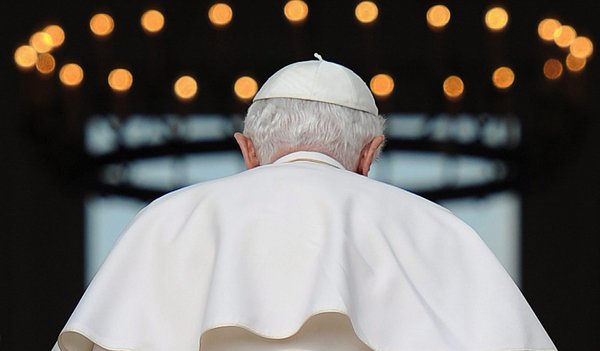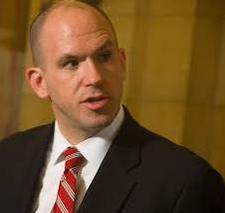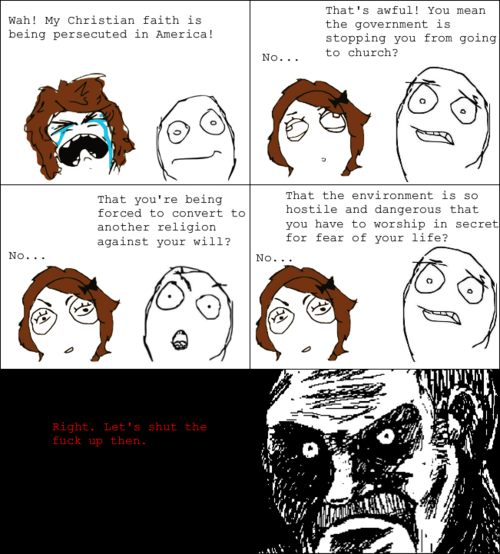Roman Catholic bishops in Illinois have shuttered most of the Catholic Charities affiliates in the state rather than comply with a new requirement that says they must consider same-sex couples as potential foster-care and adoptive parents if they want to receive state money. The charities have served for more than 40 years as a major link in the state’s social service network for poor and neglected children.
The bishops have followed colleagues in Washington, D.C., and Massachusetts who had jettisoned their adoption services rather than comply with nondiscrimination laws.
 For the nation’s Catholic bishops, the Illinois requirement is a prime example of what they see as an escalating campaign by the government to trample on their religious freedom while expanding the rights of gay people. The idea that religious Americans are the victims of government-backed persecution is now a frequent theme not just for Catholic bishops, but also for Republican presidential candidates and conservative evangelicals.
For the nation’s Catholic bishops, the Illinois requirement is a prime example of what they see as an escalating campaign by the government to trample on their religious freedom while expanding the rights of gay people. The idea that religious Americans are the victims of government-backed persecution is now a frequent theme not just for Catholic bishops, but also for Republican presidential candidates and conservative evangelicals.
“In the name of tolerance, we’re not being tolerated,” said Bishop Thomas J. Paprocki of the Diocese of Springfield, Ill., a civil and canon lawyer who helped drive the church’s losing battle to retain its state contracts for foster care and adoption services.
The Illinois experience indicates that the bishops face formidable opponents who also claim to have justice and the Constitution on their side. They include not only gay rights advocates, but also many religious believers and churches that support gay equality (some Catholic legislators among them). They frame the issue as a matter of civil rights, saying that Catholic Charities was using taxpayer money to discriminate against same-sex couples.
Tim Kee, a teacher in Marion, Ill., who was turned away by Catholic Charities three years ago when he and his longtime partner, Rick Wade, tried to adopt a child, said: “We’re both Catholic, we love our church, but Catholic Charities closed the door to us. To add insult to injury, my tax dollars went to provide discrimination against me.”
The bishops are engaged in the religious liberty battle on several fronts. They have asked the Obama administration to lift a new requirement that Catholic and other religiously affiliated hospitals, universities and charity groups cover contraception in their employees’ health plans. A decision has been expected for weeks now.
At the same time, the bishops are protesting the recent denial of a federal contract to provide care for victims of sex trafficking, saying the decision was anti-Catholic. An official with the Department of Health and Human Services recently told a hearing on Capitol Hill that the bishops’ program was rejected because it did not provide the survivors of sex trafficking, some of whom are rape victims, with referrals for abortions or contraceptives.
Critics of the church argue that no group has a constitutional right to a government contract, especially if it refuses to provide required services.
But Anthony R. Picarello Jr., general counsel and associate general secretary of the United States Conference of Catholic Bishops, disagreed. “It’s true that the church doesn’t have a First Amendment right to have a government contract,” he said, “but it does have a First Amendment right not to be excluded from a contract based on its religious beliefs.”
The controversy in Illinois began when the state legislature voted in November 2010 to legalize civil unions for same-sex couples, which the state’s Catholic bishops lobbied against. The legislation was titled “The Illinois Religious Freedom Protection and Civil Unions Act,” and Bishop Paprocki said he was given the impression that it would not affect state contracts for Catholic Charities and other religious social services.
In New York State, religious groups lobbied for specific exemption language in the same-sex marriage bill. But bishops in Illinois did not negotiate, Bishop Paprocki said.
“It would have been seen as, ‘We’re going to compromise on the principle as long as we get our exception.’ We didn’t want it to be seen as buying our support,” he said.
Catholic Charities is one of the nation’s most extensive social service networks, serving more than 10 million poor adults and children of many faiths across the country. It is made up of local affiliates that answer to local bishops and dioceses, but much of its revenue comes from the government. Catholic Charities affiliates received a total of nearly $2.9 billion a year from the government in 2010, about 62 percent of its annual revenue of $4.67 billion. Only 3 percent came from churches in the diocese (the rest came from in-kind contributions, investments, program fees and community donations).
In Illinois, Catholic Charities in five of the six state dioceses had grown dependent on foster care contracts, receiving 60 percent to 92 percent of their revenues from the state, according to affidavits by the charities’ directors. (Catholic Charities in the Archdiocese of Chicago pulled out of foster care services in 2007 because of problems with its insurance provider.)
When the contracts came up for renewal in June, the state attorney general, along with the legal staff in the governor’s office and the Department of Children and Family Services, decided that the religious providers on state contracts would no longer be able to reject same-sex couples, said Kendall Marlowe, a spokesman for the department.
The Catholic providers offered to refer same-sex couples to other agencies (as they had been doing for unmarried couples), but that was not acceptable to the state, Mr. Marlowe said. “Separate but equal was not a sufficient solution on other civil rights issues in the past either,” he said.
Catholic Charities in the Diocese of Rockford decided at that point to get out of the foster care business. But the bishops in Springfield, Peoria, Joliet and Belleville decided to fight, filing a lawsuit against the state.
Taking a completely different tack was the agency affiliated with the conservative Lutheran Church Missouri Synod, which, like the Catholic Church, does not sanction same-sex relationships. Gene Svebakken, president and chief executive of the agency, Lutheran Child and Family Services of Illinois, visited all seven pastoral conferences in his state and explained that the best option was to compromise and continue caring for the children.
“We’ve been around 140 years, and if we didn’t follow the law we’d go out of business,” Mr. Svebakken said. “We believe it’s God-pleasing to serve these kids, and we know we do a good job.”
In August, Judge John Schmidt, a circuit judge in Sangamon County, ruled against Catholic Charities, saying, “No citizen has a recognized legal right to a contract with the government.” He did not address the religious liberty claims, ruling only that the state did not violate the church’s property rights.
Three of the dioceses filed an appeal, but in November filed a motion to dismiss their lawsuit. The Dioceses of Peoria and Belleville are spinning off their state-financed social services, with the caseworkers, top executives and foster children all moving to new nonprofits that will no longer be affiliated with either diocese.
Gary Huelsmann, executive director of Catholic Social Services of Southern Illinois, in the Belleville Diocese, said the decision was excruciating for everyone.
“We have 600 children abused and neglected in an area where there are hardly any providers,” he said. “Us going out of business would have been detrimental to these children, and that’s a sin, too.”
The work will be carried on, but the Catholic Church’s seminal, historic connection with it has been severed, noted Mr. Marlowe, the spokesman for the state’s child welfare agency. “The child welfare system that Catholic Charities helped build,” he said, “is now strong enough to survive their departure.”
Complete Article HERE!
 When speaking to the Pope, you may not speak about yourself, and when the meeting is over you may not reveal the contents of the face-to-face conversation. In a papal audience or the brief exchange during the “baciamano,” the Pope must not be asked personal questions – only questions of general interest. To approach him, one must await the ceremonial gesture or the prelate who accompanies the Pope, according to the circumstances. For example, in audiences granted to lay and religious personnel of Vatican congregations, universities, ecclesiastical courts, and pontifical councils (sometimes accompanied by family), the prefect or the president, accompanied by the head of the department, introduces each individual to the Pope, just as the superior of the order or head of a community does when they are welcomed by or are welcoming the Holy Father. The order of presentation and the names admitted to the “baciamano” are arranged with the protocol office of the Secretary of State, then with prefecture of the Pontifical House to ensure compliance.
When speaking to the Pope, you may not speak about yourself, and when the meeting is over you may not reveal the contents of the face-to-face conversation. In a papal audience or the brief exchange during the “baciamano,” the Pope must not be asked personal questions – only questions of general interest. To approach him, one must await the ceremonial gesture or the prelate who accompanies the Pope, according to the circumstances. For example, in audiences granted to lay and religious personnel of Vatican congregations, universities, ecclesiastical courts, and pontifical councils (sometimes accompanied by family), the prefect or the president, accompanied by the head of the department, introduces each individual to the Pope, just as the superior of the order or head of a community does when they are welcomed by or are welcoming the Holy Father. The order of presentation and the names admitted to the “baciamano” are arranged with the protocol office of the Secretary of State, then with prefecture of the Pontifical House to ensure compliance.




